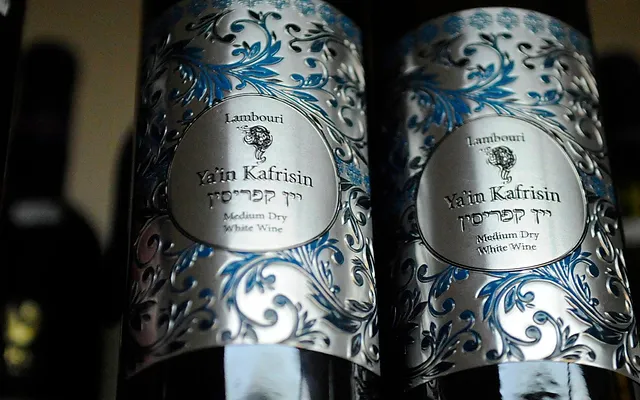An increase in Kosher products on the island, combined with the opening up of the once protective Israeli market, has widened prospects of Cypriot exports to the neighbouring country.
The local Jewish community are pleased to see the list of Kosher products rapidly growing in recent months.
At the same time, Israel has lifted customs duty applicable to various cheese products, paving the way for Cypriot producers to enter a nearby market.
In comments to the Financial Mirror, Rabbi Levi Yudkin, the Director of Cyprus Kosher, in charge of certifying products, said there is growing demand from local producers for certification.
Cyprus Kosher is the country’s only official kosher certification agency.
It was established in 2003 as a branch of the Chief Rabbinate of Cyprus – the supreme religious authority for Jewish law and practice.
Rabbi Yudkin said the list has been growing as factories seek to cover the needs of the local Jewish community but also boost their exports to Israel and other countries with Jewish communities.
“In the last months, we have been busy with applications for Kosher certification from an ever-growing number of producers, from Halloumi to wines,” said Rabbi Yudkin.
He said Cyprus Kosher products have grown to include more cheesemakers, who, apart from halloumi, have also added other Cypriot cheeses such as Anari and yoghurts.
The list has grown to include olives, olive oil, olive spreads, gourmet salt, tahini, and honey products.
Rabbi Yudkin said that although most Kosher exports head to Israel, producers send products to the USA, UK, Australia, Canada, France, Belgium, and many other countries.
A recent Israeli government decision to lift customs duties on some products has opened up the once-closed market.
Cypriot dairy producers are excited that Israel has lifted customs duty applicable to various cheese products, paving the way for halloumi to conquer.
According to Rabbi Yudkin, the number of dairy producers with a Kosher line has increased rapidly in the past year, including the dairies of Achnagal, Pantiyeros, Papouis Dairies, and Alambra.
In recent comments to the Financial Mirror, Chamber of Commerce and Industry representative Andreas Andreou said the businesses, especially dairy producers, were happy to see the neighbouring country lift duties on selected products.
“Although Israel is Cyprus’ fourth largest trading partner, exports to the country are around 3-4%, as the Israeli market is tough to crack, as it was heavily protected with high taxes imposed on imports,” said Andreou.
Wineries, soft drinks and beer producers have come forward requesting to have products Kosherised.
KEO had recently reinstated its Kosher beer line and resumed exports after backing out of the market a few months before the COVID pandemic as their contract with a local promoter expired.
“Companies who have obtained kosher certificates are KEAN soft drinks, Lambouris Winery, SEVEGEP drinks, and KEO beer.
“We have also had incoming interest from Israeli and European kosher food importers for products of Rikkos tahini, Papafilipou (ice cream), Frou-Frou, Blossom, Hadjigiorkis and Mitsides flour mills,” said the Rabbi.
Kosher meat
“We would ideally like to see the 6,000-family-strong Jewish community on the island be able to meet their Kosher food needs with products from the island.
“The main difficulty is sourcing Kosher meat.
“Our needs in fish and other products are more or less met.”
In 2020 the Council of Ministers abolished a regulation allowing the Kosher slaughter of animals without prior notice to conform, as authorities adopted EU regulations.
“Consequentially depriving the Jewish community of Cyprus of meat.”
To support his argument that the government should reconsider the regulation, Rabbi Yudkin said there are four kosher hotels and five kosher restaurants across the island, serving Jewish locals and tourists.
Last year 277,397 travellers from Israel visited Cyprus.
Calculating the value of Kosher products being exported to Israel is difficult, as authorities tasked with monitoring exports do not distinguish between Kosher and non-Kosher.
The Cyprus Trade Center at the embassy in Tel Aviv does not have a clear picture of how much Kosher imports to Israel are worth.
“What we can confirm is the rising trend in imports from Cyprus.
“In the first eleven months of the year, Cyprus imports were worth €73 mln, already up from the €65 mln,” an embassy official said.
In comments to the Financial Mirror, Sofronis Papageorgiou, head of the Cyprus Trade Centre, said the Israeli market was tough to crack due to high customs duties.
“At the end of January 2023, the Cyprus Trade Center Tel Aviv was briefed on the package of measures implemented by the Israeli Government in the context of the reform of the trade import sector,” said Papageorgiou.
The reform includes optimising product import procedures, harmonising with international health and safety standards, and encouraging and expanding competition in the consumer goods market, with the ultimate goal of reducing the cost of living in Israel.
“This cancellation of the customs duty could also increase the variety of cheeses imported to Israel so the consumer can enjoy a wider selection, including, hopefully, our products”.
Until recently, Halloumi imports to Israel were taxed with a duty of NIS 8.32 per kg, equal to €2.13, making the market unattractive.
“The lifting of the tax does not mean the Israeli market will suddenly be conquered by halloumi or other Cypriot products.
“On the contrary, the market is still filled with challenges, mainly because exports must be Kosher,” said Papageogiou.
According to local laws, imported goods are given a shorter shelf-life, while halloumi must compete with a wide variety of cheeses and dairies.
“Furthermore, the local market is not familiar with products of origin.
“Exporters from Cyprus would need a strong marketing campaign to place their products among those preferred by locals”.










